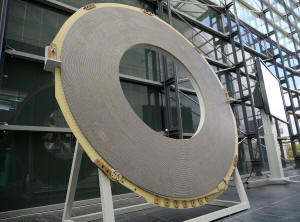|
In
July, two papers by South Korean scientists appeared on a
website used by scientists to share research before formal peer
review and publication claiming to have found a superconductor
dubbed LK-99. They said it worked at room temperature, which has
long been considered a holy grail for scientists.
The papers sparked a social media frenzy and stock moves over
their superconductor claims.
However, a white paper from the Korean Society of
Superconductivity and Cryogenics, published with the help of
eight local laboratories, said it found no cases showing zero
resistance or instances of the so-called Meissner effect, when
superconducting material repels a magnetic field.
"For the claim that LK-99 is a room-temperature, normal-pressure
superconductor to be not just a claim but to be proven
scientifically universal, there must be cross-measurement and
replication by a third party," the society said.
Attempts by the group to replicate the results failed and
Quantum Energy Research Centre, whose researchers were among the
authors of the papers, was asked to submit samples in order to
verify the findings but did not provide them, the group said,
leaving the verification process incomplete.
The authors of superconductor claims did not immediately respond
to a request for comment.
(Reporting by Hyunsu Yim; Editing by Ed Davies and Christian
Schmollinger)
[© 2023 Thomson Reuters. All rights
reserved.]
Copyright 2022 Reuters. All rights reserved. This material may
not be published, broadcast, rewritten or redistributed.
Thompson Reuters is solely responsible for this content.

|
|




